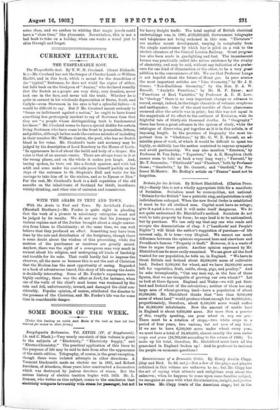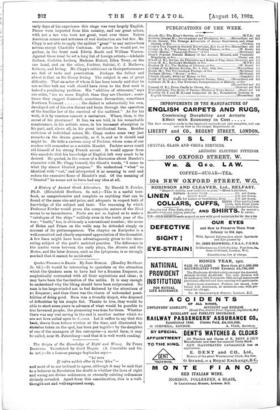Reminiscences of a Dramatic Critic. By Henry Austin Clapp. (Gay
and Bird. 7s. 6d. net.)—Not a few of the plays and players criticised in this volume are unknown to us ; but Mr. Clapp has the art of saying what attracts and enlightens even about the unknown; when he happens to come upon some familiar subject, we recognise at once with what discrimination, insight, and justice he writes. Kr. Clapp treats of the American stage ; but in the
early days of his experience this stage was very largely English. Pieces were imported from this country, and our great actors, with not a few who were not great, went over there. Native American actors and actresses of real distinction are but few. Mr. Clapp is not able to apply the epithet " great " to any native-born actress except Charlotte Cushman. Of actors he would put, we gather, in the front rank Edwin Booth and William Warren. Against these must be set a long list of foreign artists,—Adelaide Neilson, Carlotta Leclerq, Madame Ristori, Ellen Terry, on the one hand, and on the other, Fechter, Salvini, C. J. Mathews, Sothern, and Irving. Mr. Clapp's criticisms on theirperformances are full of taste and penetration. Perhaps the fullest and ablest is that on Sir Henry Irving. The subject is one of great difficulty. That an actor of whom it has been tersely said that he can neither talk nor walk should have risen to the first rank is indeed a perplexing problem. His " oddities of utterance," says our critic, "are no more English than they are Choctaw ; some- times they suggest Cornwall, sometimes Devonshire, sometimes
Northern Vermont the dialect is substantially his own, developed out of his own throat and brain through the operation of the familiar law of the survival of the unfittest." As for his walk, it is by common consent a caricature. Where, then, is the secret of his greatness ? It lies, we are told, in his remarkable countenance, in his artistic sense, in his incessant absorption in his part, and, above all, in his great intellectual force. Besides criticism of individual actors, Mr. Clapp makes some very just remarks on the drama generally, as it is, and as it should and might be. He tells a curious story of Fechter, whom some of our readers will remember as a notable Hamlet. Fechter never could rid himself of his strong French accent. It would appear from this anecdote that his knowledge of English left very much to be desired. He quoted, in the course of a discussion about Hamlet's character with Mr. Clapp himself, the Ghost's words, "I come to whet thy almost blunted purpose." He understood "whet" as identical with " wet," and interpreted it as meaning to cool and reduce the excessive flame of Hamlet's zeal. Of the meaning of " blunted" he seems not to have had any idea at all.



































 Previous page
Previous page